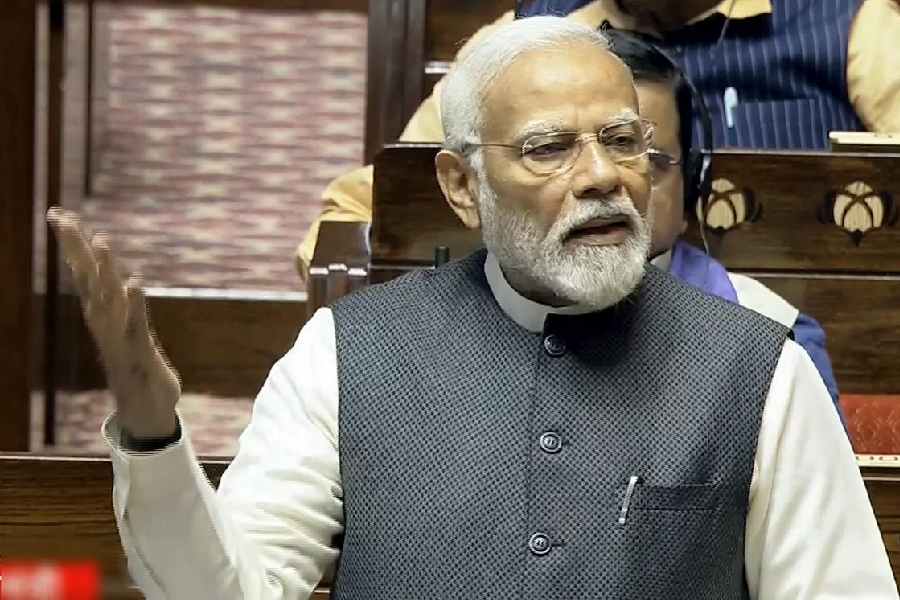Civil society groups and activists on Friday released a “chargesheet” citing instances of the Narendra Modi government going against parliamentary norms.
The main issues highlighted in the document are the absence of a Deputy Speaker in the Lok Sabha, the lowest number of sittings of the House, excessive dependence on ordinances, and passage of bills without sufficient discussion.
Lack of transparency and scrutiny, evasion of questions and the suspension of MPs in the previous winter session have also been flagged.
Releasing the “chargesheet” online on Friday, Ahmedabad-based Jesuit activist Cedric Prakash said: “We need to take this chargesheet to the rest of India…. Fear has prevented lots of people from speaking out.”
The document said: “This is the first time since Independence, that the term of a Lok Sabha will complete with the post of Deputy Speaker remaining vacant despite the mandate of Article 93 of the Constitution that stipulates that Lok Sabha ‘shall’ choose a Speaker and a Deputy Speaker as soon as may be. Since the Speaker is usually a nominee of the government, the Deputy Speaker has conventionally been a nominee of the Opposition.”
Nomination of Opposition members as Deputy Speakers is a trend that began with the appointment of G.G. Swell of the All Party Hill Leaders Conference in 1969.
The document added that the current Lok Sabha broke the preceding House’s record of the lowest number of sittings — “approximately 278 (including the scheduled Budget Session of 2024). This is markedly lower (approx. 34% lesser sittings) compared to even the NDA’s own first full term — 423 sittings during the 13th Lok Sabha (1999-2004).”
In 2020, owing to the pandemic, only 33 sittings were held at a time many other countries had online sittings of legislatures.
“When Govt completes its own agenda for the session, it gets the session adjourned ahead of schedule. Between 2020 and 2022, seven consecutive sessions ended ahead of schedule. The special session and Winter Session in 2023 also ended ahead of schedule. When a session ends ahead of schedule, all questions asked for the remaining days lapse..,” the chargesheet said.
It added: “Under the UPA II government, between 2004-14, 61 Ordinances were promulgated. Between 2014 and 2021, this record had already been broken with 76 Ordinances… So far in the 17th Lok Sabha (as on 21 December, 2023), 86 Bills in the Lok Sabha and 103 Bills in the Rajya Sabha have been passed with debate time of less than 2 hours… A new record was set in the Monsoon Session of 2023, when the Rajya Sabha passed the Pharmacy (Amendment) Bill within just 3 minutes. The next day, the Lok Sabha cleared two Bills — Central GST Amendment and Integrated GST Amendment Bill – within 3 minutes!”
The chargesheet explained that in the last Parliament session, the government's originally proposed agenda mentioned only three bills, "but not only did Govt introduce 3 more new Bills not originally included in agenda, but pushed at least two more Bills pending from previous sessions which were also not part of its agenda…"
“From 71% of all bills being referred to the Standing Committees between 2009-2014, since 2019, only 16% of bills have been referred to the Standing Committees.
“Only 74 out of 301 i.e. 24.5% of Bills introduced in Parliament were circulated for consultation between 2014 and 2021. Of these 74 Bills, at least 40 were not circulated for 30 days, as specified in the Pre-Legislative Consultative Policy… The Standing Committee on Home Affairs chaired by a BJP MP which was studying the three criminal Bills did not invite comments from the public. Several Opposition MPs submitted dissent notes alleging that the Committee rushed with the process and only invited selected people to depose before the Committee.”
Since 2014, only five bills have gone to joint parliamentary committees.
“Between 2016 and 2023, on average, 79% of the budget has been passed without discussion… The Budget Session has a recess in between to enable Standing Committees to scrutinise the Budget of each Ministry in detail… From a 40-day recess in 2016, the recess came down to only 20 days in 2021.”
The "chargesheet" added: “This time the Opposition’s protest demanding debate on the Parliament security breach led to an unprecedented 146 MPs... being suspended. This is the highest number of MPs to have been suspended ever… After the suspension of MPs, several crucial Bills were pushed through both Houses including the three criminal Bills, the Telecommunication Bill, the Bill for appointment of Chief Election Commissioner and other Election Commissioners etc.”
It said: “Close to 290 Questions asked by Opposition MPs were deleted after they were suspended from the House during the Winter Session of 2023. There are no rules which provide for Questions of suspended MPs to be deleted.
“This was not the first time this has been done. There are media reports of this happening in 2015 and since then there are records of this happening in 2020, 2021 and again in 2023.”











